前景英语1UNIT 4教案
新视野大学英语第三版读写1unit4教案

教学目标:1. 培养学生运用英语进行阅读、写作和口语表达的能力。
2. 帮助学生了解不同文化背景下的旅行观念,提高跨文化交际能力。
3. 通过本单元的学习,使学生掌握以下知识点:a. 旅行目的的种类及特点;b. 旅行过程中的注意事项;c. 如何撰写旅行日记。
教学重点:1. 旅行目的的种类及特点;2. 旅行过程中的注意事项;3. 旅行日记的写作技巧。
教学难点:1. 如何在写作中运用丰富的词汇和句型;2. 如何将旅行过程中的所见所闻转化为生动的文字。
教学准备:1. 教学课件;2. 旅行相关图片、视频等资料;3. 学生旅行日记样本。
教学过程:一、导入(5分钟)1. 利用多媒体展示一组旅行图片,激发学生的学习兴趣。
2. 提问:同学们,你们喜欢旅行吗?为什么?3. 引导学生思考:旅行有什么意义?本单元我们将学习不同种类的旅行目的。
二、阅读理解(20分钟)1. 学生自主阅读课文,了解不同种类的旅行目的。
2. 小组讨论:根据课文内容,列举出几种旅行目的,并简要说明其特点。
3. 教师总结:旅行目的主要有休闲、探险、学习、工作等,每种目的都有其独特的魅力。
三、写作指导(20分钟)1. 教师讲解旅行日记的写作技巧,包括:开头、正文、结尾等部分。
2. 学生根据所学内容,以“我的旅行经历”为主题,撰写一篇旅行日记。
3. 教师挑选优秀作品进行展示,并给予点评。
四、口语表达(10分钟)1. 学生分组,每组选派一名代表,分享自己的旅行经历。
2. 小组内互相提问,增进了解。
五、总结与作业(5分钟)1. 教师对本节课的内容进行总结,强调旅行目的的种类及特点。
2. 布置作业:以“我心中的旅行目的地”为主题,撰写一篇短文,不少于300字。
教学反思:本节课通过阅读、写作和口语表达等多种形式,使学生了解了不同种类的旅行目的,掌握了旅行日记的写作技巧。
在教学过程中,要注意以下几点:1. 注重激发学生的学习兴趣,提高课堂氛围;2. 鼓励学生积极参与课堂活动,培养学生的团队合作精神;3. 注重对学生写作和口语表达的指导,提高学生的综合语言运用能力。
新视野大学英语读写教程1unit4教案
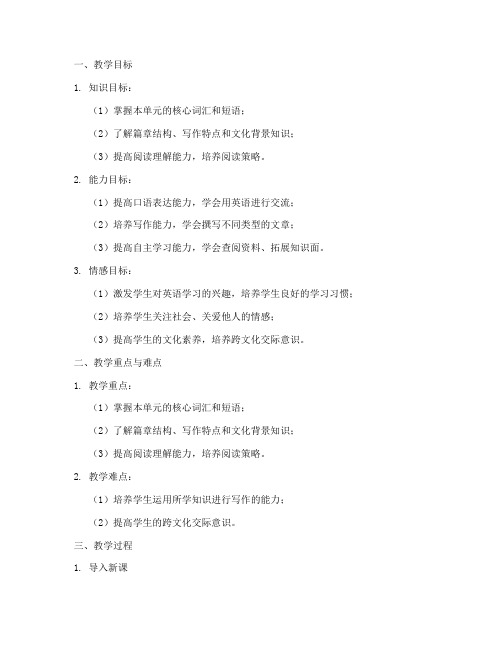
一、教学目标1. 知识目标:(1)掌握本单元的核心词汇和短语;(2)了解篇章结构、写作特点和文化背景知识;(3)提高阅读理解能力,培养阅读策略。
2. 能力目标:(1)提高口语表达能力,学会用英语进行交流;(2)培养写作能力,学会撰写不同类型的文章;(3)提高自主学习能力,学会查阅资料、拓展知识面。
3. 情感目标:(1)激发学生对英语学习的兴趣,培养学生良好的学习习惯;(2)培养学生关注社会、关爱他人的情感;(3)提高学生的文化素养,培养跨文化交际意识。
二、教学重点与难点1. 教学重点:(1)掌握本单元的核心词汇和短语;(2)了解篇章结构、写作特点和文化背景知识;(3)提高阅读理解能力,培养阅读策略。
2. 教学难点:(1)培养学生运用所学知识进行写作的能力;(2)提高学生的跨文化交际意识。
三、教学过程1. 导入新课(1)播放与本单元主题相关的视频或图片,激发学生的学习兴趣;(2)引导学生讨论与本单元主题相关的问题,如:“你认为什么是真正的友谊?”等。
2. 阅读理解(1)让学生快速阅读课文,了解文章大意;(2)引导学生分析文章结构,归纳段落大意;(3)针对课文内容,设置问题,让学生进行思考、讨论;(4)总结课文,加深学生对文章的理解。
3. 词汇学习(1)讲解本单元的核心词汇和短语,让学生掌握其用法;(2)设置词汇练习,巩固所学知识;(3)引导学生运用所学词汇进行口语和写作练习。
4. 写作指导(1)分析本单元的写作特点,如:议论文、说明文等;(2)指导学生进行写作,如:如何提出观点、如何组织论据等;(3)让学生进行写作练习,教师批改并给予反馈。
5. 课堂小结(1)回顾本节课所学内容,强调重点和难点;(2)布置课后作业,巩固所学知识。
四、教学评价1. 课堂表现:观察学生在课堂上的参与度、互动性等;2. 作业完成情况:检查学生的课后作业,了解学生对知识的掌握程度;3. 写作能力:通过写作练习,评估学生的写作水平;4. 口语表达能力:通过课堂讨论、角色扮演等方式,评估学生的口语表达能力。
高中英语新人教版必修一Unit4NaturalDisasters教案
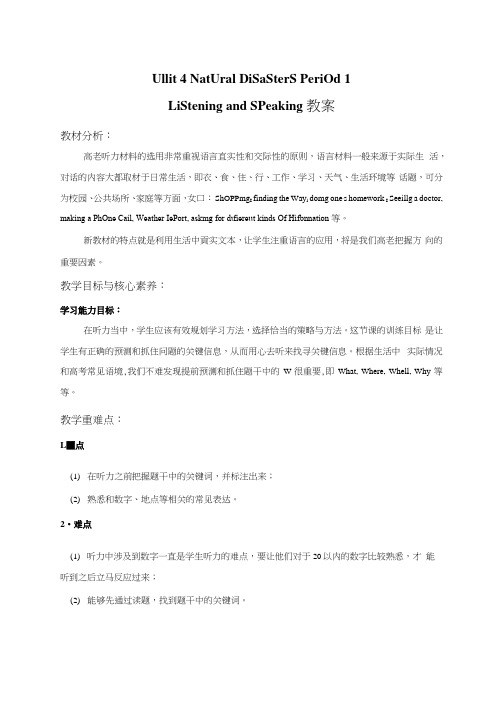
Ullit 4 NatUral DiSaSterS PeriOd 1LiStening and SPeaking 教案教材分析:高老听力材料的选用非常重视语言直实性和交际性的原则,语言材料一般来源于实际生活,对话的内容大都取材于日常生活,即衣、食、住、行、工作、学习、天气、生活环境等话题,可分为校园、公共场所、家庭等方面,女口:ShOPPmg I finding the Way l domg one,s homework I Seeillg a doctor, making a PhOne Cail, Weather IePort, askmg for dιfiereιιt kinds Of Hifbnnation 等。
新教材的特点就是利用生活中貢实文本,让学生注重语言的应用,将是我们高老把握方向的重要因素。
教学目标与核心素养:学习能力目标:在听力当中,学生应该有效规划学习方法,选择恰当的策略与方法。
这节课的训练目标是让学生有正确的预测和抓住问题的关键信息,从而用心去听来找寻关键信息。
根据生活中实际情况和高考常见语境,我们不难发现提前预测和抓住题干中的W很重要,即What, Where, Whell, Why 等等。
教学重难点:L■点(1)在听力之前把握题干中的关键词,并标注出来;(2)熟悉和数字、地点等相关的常见表达。
2•难点(1)听力中涉及到数字一直是学生听力的难点,要让他们对于20以内的数字比较熟悉,才能听到之后立马反应过来;(2)能够先通过读题,找到题干中的关键词。
教学过程:Unit 4 NatUrai DiSaSterS PeriOd 2Reading and Thinking 教案教学目标与核心素养:1.TeaCh SnIdelItS to find OUt the ParagraPh topic Sentelices, UnderStaild the basic InfbnllatIoII Of die TangShall earthquake tlιrouglι SkHliining, SearCIlIng aιιd Other Ieadmg SkiIIs.2.Enable SnldelltS to SOrt OUt the details Of the paragraph, to UnderStand the Strange things before die TangShan earthquake, the tremendous destructive force CaUSed by the eartlιquake, and the IaPld and SeIfleSS rescue and reconstruction after the disaster.3.DiSClISS the tliuiking brought by eartlιquake and SUblillIate the theme SignIfiCanee.教学重难点:1.DeVelOP students' IeadIng ability SUCh as Skmiming, SCanning and SllIninarIZing.2.Let StlIdentS talk about the PreCUrSOr before the earthquake, the damage CaUSed by theearthquake, the IeSCUe after die earthquake and die reconstnιctιon after die earthq uake.教学过程:SteP 1 ACtivity 1ACtiVating background informationT: TOday We are gomg to Iearn a PaSSage With the title -The Night the EartIl Didn't Sleep,∖ SO Why didn't the earth SleeP on that night? What happened to the earth? ACnlany there is a movie directed by Feng XlaOgang focuses On the SaIIle earthquake. Now, Γd IIke to ShOW you a SIlOrt CllP Of die movie.1.TaIk about the earthquakeQl: What do you Ieanl from the video?2.Talk about TangShall earthquake.Ql: What do you know about TangShan earthquake?Q2: What do you Want to know about it?SteP 2 AXtiVity 2Reading to get SOme basic information about earthquake1.Read quickly to find the answers to the students' OWn questions.2.Read for the topic SentelICeS and ∖λr ork OUt the OrgallIZatIOn Of die text.Ql: What,s tlιe topic SentenCe m each paragraph?Q2: In What Order does the author describe die earthquake?SteP 3 ACtiVity 3Reading for detailed information1.Read to get detailed information about ParagraPh 1.Ql: What Were tlιe Strange tilings?Q2: What WaS people's IeaCtIOn to tlιese Strange tilings?Q3. Why didn't PeOPle Pay attention to these Strange thmgs/the SignS before the earthquake? T: PeOPle had Iittle knowledge Of earthquake at tlιat tune.Q4: When does this ParagraPh mainly talk about?T: AbnOnilal SigllS before the eartlιquake.2.Read to get detailed InfbrmatiOn about ParagraPh 2.Ql: HOW StrOng WaS die earthquake?Q2: HOW did the PeOPle feel Whell die earthquake happened?Q3: What does this ParagraPh mamly talk about?3.Read to get detailed information about Para. 3.Ql: What Were destroyed?Q2: HOW does die ∖λτιter describe 飞VerythIng iιι the city"?Q3: HOW did the PeOPle feel?Q4: What does this ParagraPh mamly talk about?4.Read to get detailed information about ParagraPh 4.Ql: WhO brought hope back? And Wllat did tlιey do?Q2: HOW did the PeOPle feel after a IOt Of PeOPle Came to rescue?Q3: HOW WaS the City after a IOt Of PeOPle Came to rescue?5.Read to get detailed InfbrmatiOn about ParagraPh 5.Ql: What ShOWS the revival OfTangShaιι?Q2: HOW Call TallgShaIl WViVe itself aιιd get UP On its feet agam?Q3: In tmιes Of disasters, how Can We go tlιrouglι it?T: Iii times Of disasters, We ShOUld unify; ShOW the WiSdom and Stay positive.SteP 4 AXtiVity 4HighIighting the theme and reflecting1.Make a SuinnIary Of die text.2.FUrther IInderStalld the titleQ: After Ollr Ieanimg, Why do you tlιιnk the earth didn't SleeP On tlιat Ilight?T: An earthquake happened. The PeOPle In the earthquake SUfiered a lot. and die PeOPle OUtSide TangShall Λλ-ere ConCemed about the PeOPle there a lot.3.RefleCt tlιroιιglι discussion on Wllat Can be Ieamt after reading.T: DISaSterS are POWerfiIL UnPreParedlleSS Call be deadly. Life is weak, but if PeOPle V t r QTk togetherto help each otlιer5 disasters Can be defeated.TIlere is no IOVe &om disaster, but We have IoVe In the human heart.SteP 5 ASSignmentHOW does the WrIter COlIVey tlιat the earthquake WaS deadly, and tlιat PeOPle Were helpless durmg tlιe earthquake? Try to find SOme attractive and impressive expressions and note them down.UIlit 4 NatUral DiSaSterS PeriOd 3DiSCOVering USefUl StrUCtUreS 教案教材分析:ThiS teaching PerIOd mainly deals With the granmiar: die restrictive relative clauses.ThiS PeriOd carries COnSIderable SignIfiCanCe to the CUlthβatιon Of students' Writing COmPetellCe and IayS a SOlId foundation for the basic appreciation Of Iallgllage beauty. The teacher is expected to enable StUdentS to master tlιis PerIOd thoroughly aιιd COaSOIIdate the knowledge by doing SOme exercise Of good quality.教学目标与核心素养:1.Get SnldentS to ha∖∙e a good IUIderStandlllg Of the basic USageS Of the restrictive IelatiVe clauses.2.Enable SnIdentS to USe the TeSniCtIVe relat∏∙e CIaUSeS flexibly.3.DeVelOP students' SPeaklllg and COOPeratmg abilities.4.Strellgtllell students' great mterest iιι grammar Ieainmg.【学堇难点:HOW to enable SnldentS to have a good ImderStanding Of the restrictive relative clauses, espeCiaIly the IISeS Of the IeIath*e WOrdS SUCh as which, that, who, whom.教学过程:StePl语法知识呈现定语从句(一)——关系代词的用法在复合句中,修饰名词或代词的从句叫定语从句。
英语1 基础模块 unit4 School life 教案
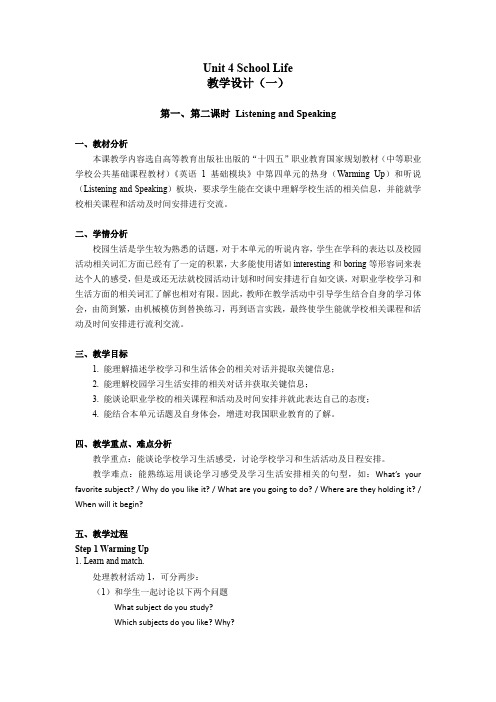
Unit 4 School Life教学设计(一)第一、第二课时Listening and Speaking一、教材分析本课教学内容选自高等教育出版社出版的“十四五”职业教育国家规划教材(中等职业学校公共基础课程教材)《英语 1 基础模块》中第四单元的热身(Warming Up)和听说(Listening and Speaking)板块,要求学生能在交谈中理解学校生活的相关信息,并能就学校相关课程和活动及时间安排进行交流。
二、学情分析校园生活是学生较为熟悉的话题,对于本单元的听说内容,学生在学科的表达以及校园活动相关词汇方面已经有了一定的积累,大多能使用诸如interesting和boring等形容词来表达个人的感受,但是或还无法就校园活动计划和时间安排进行自如交谈,对职业学校学习和生活方面的相关词汇了解也相对有限。
因此,教师在教学活动中引导学生结合自身的学习体会,由简到繁,由机械模仿到替换练习,再到语言实践,最终使学生能就学校相关课程和活动及时间安排进行流利交流。
三、教学目标1. 能理解描述学校学习和生活体会的相关对话并提取关键信息;2. 能理解校园学习生活安排的相关对话并获取关键信息;3. 能谈论职业学校的相关课程和活动及时间安排并就此表达自己的态度;4. 能结合本单元话题及自身体会,增进对我国职业教育的了解。
四、教学重点、难点分析教学重点:能谈论学校学习生活感受,讨论学校学习和生活活动及日程安排。
教学难点:能熟练运用谈论学习感受及学习生活安排相关的句型,如:What’s your favorite subject? / Why do you like it? / What are you going to do? / Where are they holding it? / When will it begin?五、教学过程Step 1 Warming Up1. Learn and match.处理教材活动1,可分两步:(1)和学生一起讨论以下两个问题What subject do you study?Which subjects do you like? Why?引导学生说出活动1中的词汇。
前景实用英语综合教程1unit4
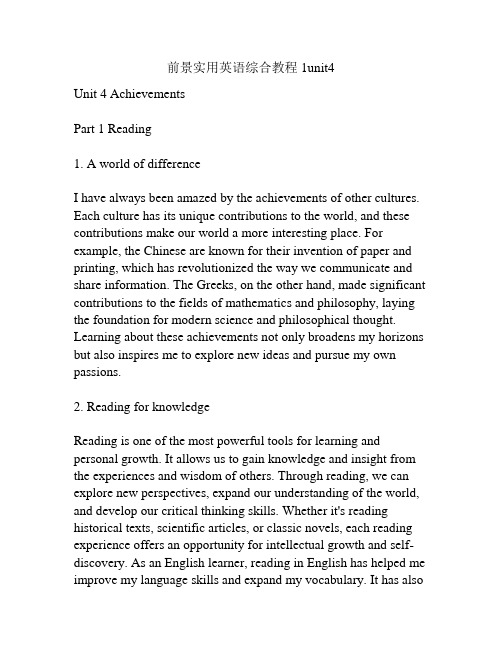
前景实用英语综合教程1unit4Unit 4 AchievementsPart 1 Reading1. A world of differenceI have always been amazed by the achievements of other cultures. Each culture has its unique contributions to the world, and these contributions make our world a more interesting place. For example, the Chinese are known for their invention of paper and printing, which has revolutionized the way we communicate and share information. The Greeks, on the other hand, made significant contributions to the fields of mathematics and philosophy, laying the foundation for modern science and philosophical thought. Learning about these achievements not only broadens my horizons but also inspires me to explore new ideas and pursue my own passions.2. Reading for knowledgeReading is one of the most powerful tools for learning and personal growth. It allows us to gain knowledge and insight from the experiences and wisdom of others. Through reading, we can explore new perspectives, expand our understanding of the world, and develop our critical thinking skills. Whether it's reading historical texts, scientific articles, or classic novels, each reading experience offers an opportunity for intellectual growth and self-discovery. As an English learner, reading in English has helped me improve my language skills and expand my vocabulary. It has alsointroduced me to different cultures and ways of thinking, making me a more open-minded and global citizen.3. The power of scienceScience has had a profound impact on the world, revolutionizing our way of life and enabling us to accomplish incredible feats. From the discovery of electricity to the development of vaccines, scientific advancements have improved our health, increased our productivity, and expanded our knowledge of the universe. Science has also played a crucial role in addressing global challenges, such as climate change and pollution. Through scientific research and innovation, we have the potential to create a sustainable future and ensure the well-being of future generations. As a student of science, I am fascinated by its power and potential to make the world a better place.Part 2 Listening1. The power of perseverancePerseverance is the key to achieving success and overcoming obstacles. It is the ability to keep going despite setbacks, challenges, and failures. Many successful individuals have attributed their achievements to their perseverance and determination. For example, Thomas Edison failed thousands of times before he successfully invented the light bulb. His famous quote "I have not failed. I've just found 10,000 ways that won't work" reflects his unwavering determination. Similarly, J.K. Rowling, the author of the Harry Potter series, faced numerousrejections before her book was finally published. Her perseverance paid off, as her books became a worldwide phenomenon. These stories remind us that success is not always immediate, and often requires hard work, resilience, and perseverance.2. Inspiration from great leadersGreat leaders throughout history have inspired and motivated people to achieve their goals and make a positive impact on the world. Their leadership qualities, such as vision, courage, and empathy, have inspired generations to strive for greatness. For example, Nelson Mandela, the former president of South Africa, showed immense courage and resilience in his fight against apartheid. His ability to forgive and promote reconciliation has made him an icon of peace and justice. Another great leader, Mahatma Gandhi, led India to independence through nonviolent resistance, inspiring others to fight for freedom and justice. These leaders remind us of the power of leadership and the potential for individuals to make a difference in the world.3. The pursuit of dreamsThe pursuit of dreams is a fundamental part of the human experience. It is the desire to achieve something meaningful and fulfilling, and to make a difference in the world. Whether it's starting a business, pursuing a creative passion, or making a positive impact on society, our dreams give us a sense of purpose and motivate us to work hard and overcome challenges. The journey towards our dreams is often filled with ups and downs, but the fulfillment and sense of accomplishment we experience whenwe achieve our goals are priceless. As we pursue our dreams, it is important to stay focused, stay true to ourselves, and never give up on what we truly believe in.Part 3 Speaking1. My greatest achievementOne of my greatest achievements is learning a new language. Learning a language requires time, effort, and dedication, and it is not always easy. However, the ability to communicate in a different language opens up a whole new world of opportunities and experiences. It allows me to connect with people from different cultures, travel to new places, and broaden my horizons. Learning a new language has also improved my cognitive abilities, such as memory and problem-solving skills. It has given me the confidence to communicate effectively in different contexts, whether it's in academic or professional settings. Overall, learning a new language has been a rewarding and fulfilling experience, andI am proud of the progress I have made.2. Overcoming challengesOvercoming challenges is an important part of personal growth and achievement. Throughout my life, I have faced various challenges that have tested my perseverance and resilience. One of the biggest challenges I have faced is balancing my academic and personal life. As a student, it is important to prioritize my studies and meet deadlines, but I also want to make time for my family and pursue my hobbies and passions. Finding a balance betweenthese different aspects of my life requires careful planning, time management, and a positive mindset. While it can be challengingat times, I have learned the importance of setting realistic goals, seeking support from others, and staying motivated. Overcoming these challenges has taught me valuable life skills and has made me a stronger and more resilient individual.3. Advice for successMy advice for success is to never stop learning and never give up. Success is a journey, and it requires continuous growth, learning, and improvement. It is important to embrace new challenges and step out of your comfort zone. Take risks, try new things, and learn from your failures. Surround yourself with positive and supportive people who believe in your potential and encourage you to pursue your goals. Most importantly, believe in yourself and your abilities. Success may not come easily or quickly, but with perseverance, determination, and a positive mindset, you can achieve your dreams and make a meaningful impact on the world. So, keep learning, keep growing, and never give up on your dreams.。
前景实用英语unit4sportsmanship
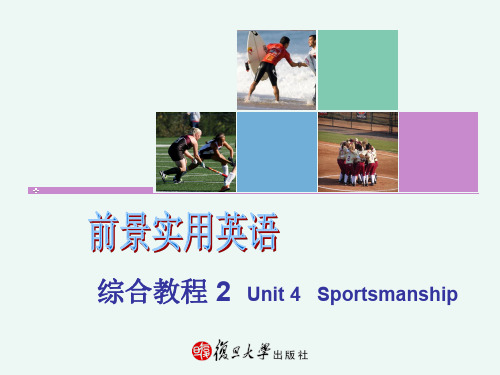
Part A Text
On the Meaning of Sports
I have never been a sporty guy. When I was a kid, whenever we played soccer in the neighborhood, the most prestigious position was the offense. Everyone wanted to be the attacker, but only the kids claiming to be the best could play it. I was always stuck with the position of defense, or sometimes even worse, playing the goal-keeper.
Part A Lead in
Task 3 Discuss the following questions.
1. Why do you think people like sports?
Cues: healthy, shape one’s body, teamwork
2. Have you done any crazy things for your idol?
tomorrow morning. The World Cup Final starts at ___2_:0_0___. W: Oh, fair enough. Is the final between Spain and the Netherlands? M: Right. I ___b_e_t___ Spain will win. W: I’m for the Netherlands. M: We’ll see. Hey, why not ___j_o_in___ me hours later? It’ll be more fun. W: I guess so. OK, I’m in. I’ll go to get some sleep. M: Great.
高一英语必修1 unit4教案(全单元)
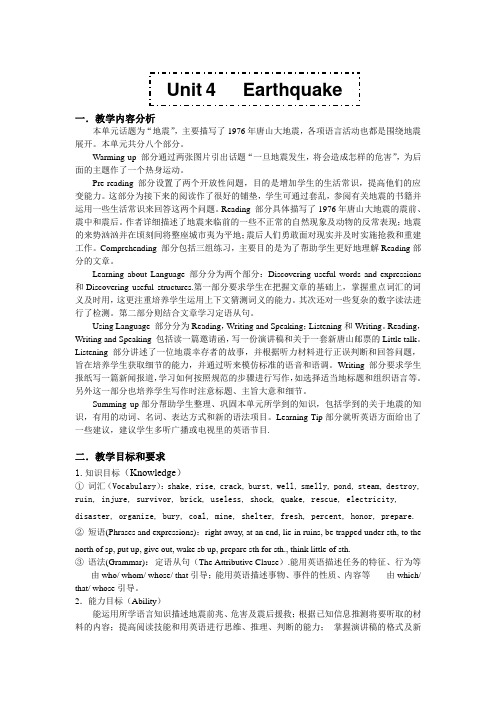
一.教学内容分析本单元话题为“地震”,主要描写了1976年唐山大地震,各项语言活动也都是围绕地震展开。
本单元共分八个部分。
Warming-up 部分通过两张图片引出话题“一旦地震发生,将会造成怎样的危害”,为后面的主题作了一个热身运动。
Pre-reading 部分设置了两个开放性问题,目的是增加学生的生活常识,提高他们的应变能力。
这部分为接下来的阅读作了很好的铺垫,学生可通过套乱,参阅有关地震的书籍并运用一些生活常识来回答这两个问题。
Reading 部分具体描写了1976年唐山大地震的震前、震中和震后。
作者详细描述了地震来临前的一些不正常的自然现象及动物的反常表现;地震的来势汹汹并在顷刻间将整座城市夷为平地;震后人们勇敢面对现实并及时实施抢救和重建工作。
Comprehending 部分包括三组练习,主要目的是为了帮助学生更好地理解Reading 部分的文章。
Learning about Language 部分分为两个部分:Discovering useful words and expressions和Discovering useful structures.第一部分要求学生在把握文章的基础上,掌握重点词汇的词义及时用,这更注重培养学生运用上下文猜测词义的能力。
其次还对一些复杂的数字读法进行了检测。
第二部分则结合文章学习定语从句。
Using Language 部分分为Reading ,Writing and Speaking ;Listening 和Writing 。
Reading ,Writing and Speaking 包括读一篇邀请函,写一份演讲稿和关于一套新唐山邮票的Little talk 。
Listening 部分讲述了一位地震幸存者的故事,并根据听力材料进行正误判断和回答问题,旨在培养学生获取细节的能力,并通过听来模仿标准的语音和语调。
Writing 部分要求学生报纸写一篇新闻报道,学习如何按照规范的步骤进行写作,如选择适当地标题和组织语言等。
2021-2022学年上教版高中英语:必修一 Unit 4 My space 单元全课时 教案

2021-2022学年上教版(2020)高中英语:必修一Unit 4 My space 单元全课时教案(教师版)课题:Reading and interaction I: The 1940s house课时学习目标:• 掌握与家用电器和家庭用品主题相关的分类词汇;• 通过“略读”,了解该实验故事涉及的主要方面;• 通过“扫读”,了解20世纪40年代英国家庭生活,体会实验参与者的感受。
I. Pre-readingTask 1: Tell the names of the following household appliances in the pictures and put them into the right category.Task 2: Look at the photo of a kitchen in a 1940s house in the UK and write down the things listed above you think the average family might have owned at that time. Imagine how different their lives were from ours today.(1) Which household appliances might an average family have owned at that time?Household applianceskitchenliving rooman oven a dishwasher a coffee maker a fridge a microwavecentral heating a radio a computer a television an air-conditionera washing machine bathrooma smart toilet...A radio and an oven because they were invented before the 1940s.(2)How different were their lives from ours today?In my opinion, life must have been very difficult for people in the 1940s because they didn’t have moder n devices such as washing machines or microwaves.Task 3: Look at the household appliances in task 1 and think about what benefits these modern appliances bring us?For example, the fridge can keep our food fresh; the washing machine can save our energy and time of washing, and the air-conditioner can keep us cool in summer and warm in winter.II. While-readingTask 4: Read the first paragraph and answer the questions.(1)What was The 1940s House really about?The 1940s House was an experiment.(2)What was the purpose of the experiment?The purpose of the experiment was to see if a modern-day family would be capable of surviving in the 1940s.Task 5: Read paragraph 2 to paragraph 6, and match the paragraphs with the headings.Paragraph 2 A. FoodParagraph 3 B. Family lifeParagraph 4 C. Daily routineParagraph 5 D. Personal safetyParagraph 6 E. HousingTask 6: Read paragraph 2 and paragraph 3 and answer the questions.(1)What did the 1940s house look like?It was a three-bedroomed house in south London. There were no labour-saving devices, no central heating or bridge in the house.(2)What did they do first? Why?Their first task was to quickly dig a hole in the garden to protect themselves from the air attacks, because safety was the most important thing during the wartime.(3)Where did they spend much time? Why?They spent much time down in the hole, because they wanted the experiment to seem as real as possible, though the war wasn't real for the Hymers.Task 7: Read paragraph 4 and paragraph 5 and answer the questions.1.What were the challenging things people were faced with in the 1940s?The shortage of food and domestic chores.2.Why didn’t the family have much to eat?Because there was rationing of goods such as food and petrol.3.How w ere men’s and women’s lives different in the 1940s?Men went out to work, while women spent most of their time doing domestic chores, such as preparing meals, doing the dishes, cleaning the floor and boiling the clothes.Task 8: Read paragraph 6 and answer the question.Does Lyn miss the 1940s house when she is back in her modern home? Why or why not?Lyn misses the 1940s house because she could do a lot of things together with her family. They shared the hard work and played board games together; they read books or talked to each other a lot; they laughed and cried together.III. Post-readingTask 9: Read the summary below and fill in each blank with a suitable word based on the language of the passage. You may change the form if necessary.The passage describes an experiment called The 1940s House in the UK. The aim was to see if a modern-day family could 1._____survive____ in the 1940s. The Hymers took part in the experiment. The family moved into a 2.____three-bedroomed_____ house in south London, where there were not any modern 3.__labour-saving__ devices. As a result, domestic 4.___chores___ which they could easily do before, now became terribly difficult.In the 1940s, personal 5. ___safety___ was a big problem because of the war. To make their experiment as6.___real___ as possible, the whole family stayed in a narrow7. ___hole___ much of the time. They also followeda wartime diet and often suffered from 8. ____hunger____ because of food rationing during the war. Despite all these difficulties, Lyn feels that her family grew closer because they 9. ___helpfully___ shared the hard work and spent more time together. According to her, an easier and more comfortable life does not 10.__necessarily__ mean a better life. What matters more is that the family spend quality time together and are emotionally connected.IV. InteractionGroup discussion: Suppose you were Lyn, would you choose to take part in The 1940s House? Share your ideas and reasons with your peers and the teacher.V. Assignments1.Try to develop the word map based on the theme of “household appliances”.plete an experiment report according to the text.3.Please retell the story with the help of your experiment report.上教版高一年级必修一第四单元第二课时教案(教师版)课题:Reading and interaction II: The 1940s house (deep reading)课时学习目标:• 深度阅读文本,从“住宅、个人安全、食物、日常家务、家庭生活”五个方面比较并解释20世纪40年代的生活与现代生活的差异;• 深入理解作者的写作意图及亲情的重要性。
- 1、下载文档前请自行甄别文档内容的完整性,平台不提供额外的编辑、内容补充、找答案等附加服务。
- 2、"仅部分预览"的文档,不可在线预览部分如存在完整性等问题,可反馈申请退款(可完整预览的文档不适用该条件!)。
- 3、如文档侵犯您的权益,请联系客服反馈,我们会尽快为您处理(人工客服工作时间:9:00-18:30)。
教案2011 ~ 2012学年第一学期专业:课程名称高职英语1班级主讲教师福州黎明职业技术学院教案编写说明教案是任课教师的教学实施方案。
为搞好教学工作,任课教师应遵循专业教学计划制订的培养目标,以教学大纲为依据,在熟悉教材、了解学生的基础上,结合教学实践经验,提前编写教案,设计好每门课程的章、节、实验或主题的全部教学活动。
每一次课(2-3节)设计1张教案首页,详案附后。
教案编写说明如下:1、编号:按施教的顺序标明序号。
2、教学课型表示所授课程的类型,如理论课、实验课、习题课、实践课等。
3、日期的填写系指本次课授课的时间。
4、教学内容:是授课的核心。
将授课的内容按逻辑层次,有序设计编排。
5、作业或思考题:提出若干问题供学生课后复习时思考,或要求以书面形式完成。
6、课后随记:要求适时记录下每次上课的成功点、不足之处、认真分析、反思。
并遵循真实性、可行行、指导性的原则。
Unit 4 SportsPart A(Period 1-2)Teaching steps:Step 1:Learning Proverbs and QuotationsLife lies in motion.生命在于运动。
Sports do not build character. They reveal it.运动揭示性格,而非铸造性格。
Step 2:Lead-in ( topic of sports of college)Task 1 Study the pictures and discuss the questions below in small groups.Use the words given below if necessary.Cues:1. football, basketball, badminton2. exciting, skills3. player, place1. What are they doing?2. Which one of the sports below do you like most? Why?3. What is the most popular sport in your college?Suggested answers:In our college, most of us play basketball, because itdoesn’t need so many people or a special place for youto play it.Task 2 Listen to the following short dialogues and fill in the blanks. Step 3: speakingDialogue 1A: Hey, nice .B: Thanks. Y ou were the match just now?A: Y eah, I’m a big fan of yours. Y ou played pretty cool.B: Really? Thanks. I’m . But do I know you?A: I don’t think so. But you are Bruce, chairman of the , right? B: Y ou got it. And you are?Step 4: listening.Listen to the following short dialogues and fill in the blanks. Dialogue 1A: Hey, nice shooting .B: Thanks. Y ou were watching the match just now?A: Y eah, I’m a big fan of yours. Y ou played pretty cool.B: Really? Thanks. I’m flattered. But do I know you?A: I don’t think so. But you are Bruce, chairman ofthe College Basketball Club , right?B: Y ou got it. And you are?Reference words●sports: football/soccer, basketball, tennis, table tennis,badminton, baseball, volleyball, cricket, golf, etc.●match: game, competition, team, player,bench player, referee, goal, score, win, lose, beat, draw,tie, foul, record, break the record, keep the record, etc.●football: field, forward, back, halfback, fullback,goalkeeper, kick off, throw in, goal kick, corner kick,free kick, etc.●basketball: three point line, boundary line, centerline, shooting, pushing, front court, mid court,back court, etc.●badminton: forehand stroke, backhand stroke,backhand side, serve,women’s singles, doubles,mixed doubles, etc.Step 5:Homework Finish Task 2-Task 6 on page 76-77.Unit 4 Part A(Period 3-4)Teaching steps:Step 1: GreetingsStep 2: Revision and Check the answers from Task2- Task 6Step 3: Read the text again, find some difficult sentences to ask for help; Teachers and Students solve the difficult sentences and key points together.Step 4: Intensive reading.List some language points.National Collegiate Boxing Association and Intercollegiate Rowing Association. The first tier is characterized by selective participation, since only the elite athletes in their sport are able to participate. The second tier includes all intramural and recreational sports clubs, which are available to a larger portion of the student body. Competition between student clubs from different colleges, not organized by and therefore not representing the institutions or their faculties, may also be called “int ercollegiate” athletics or simply college sports.◆flier: n. a small sheet of paper that advertises a productspring break training, but this time as a supportive member.Over lunch, I asked the team how college sports added to their overall college experience.◆ supportive: a. giving help, encouragement to somebodye.g. Mary was so supportive during my father’s illness.在我父亲生病期间,玛丽给了很多帮助。
He just played a supportive role in the movie.他在那部电影中只担任了配角。
◆freshman: n. a student who is in his or her first year ata university or collegee.g. I sat in my car to read a letter from my eldest daughterLinda, a college freshman.我坐在车里看大女儿琳达寄来的信,她是大一的学生。
◆ infamous: a. well known for being bad or evile.g. That infamous criminal was finally sentenced to death.那个臭名昭著的罪犯终于被判处死刑。
Tom is infamous for his practical jokes.汤姆因其恶作剧而声名狼藉。
◆sophomore: n. a student in the second year of a course of study at a university or collegee.g. When my son was a sophomore, he got a part-time job at a supermarket.我儿子大学二年级时,在一家超级市场找到了一份兼职。
◆relatively: ad. to a fairly large degree, especially in comparison to otherse.g. The final exam was relatively easy.这次期末考试比较容易。
